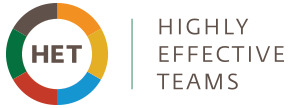
Organizational & Team Culture Coaching Services
Why Are We Talking About Culture?
We are in an era of complexity, accelerated change, and uncertainty. We believe there is a common thread of humanity that binds us together and needs to be taken into account when designing organizational systems and tending to organizational culture.
“Culture eats strategy for breakfast” is an expression first coined by management consultant Peter Drucker, and one that is commonly used today. An organization, even one with a clear and compelling strategy, will not succeed without a healthy organizational culture that is aligned with its goals.
We like to think of culture as the soil, with strategy as the grass that grows in the healthy soil. At HET, we work with you to foster a culture of teamwork that will improve the performance of your teams, and ultimately, the culture of your organization.
What is Organizational Culture?
Culture is the observable manifestation that we experience of what is truly valued and not valued in an organization, exhibited through behaviors that expose mindsets. One way to know an organization’s culture is by paying attention to the stories and legends that are told. Culture is about what is tolerated or rewarded, which perpetuates behaviors and what behaviors are stamped out publicly enough to deter others and reinforce the organization’s values and culture.
Create a Healthy Organization
HET is a system for changing mindsets and behaviors at an individual level until a tipping point is reached, and organizational culture improves as well. Organizational change starts with one person and one team at a time. HET promotes behaviors that any one of us can adopt and implement on our own. We believe that the more we adopt these behaviors, the more we will have teams of people who feel happy, valued, and committed instead of frustrated, confused, and overwhelmed. And that leads to healthier culture.
Organizations with healthy cultures:
- Promote psychological safety.
- Build interpersonal and organizational trust.
- Eliminate conditions that cause toxic fear and lead to unacceptable behaviors.
Promote Psychological Safety
A well documented study at Google found that their most successful teams shared five traits:
- Dependability and accountability
- Structure and clarity
- Meaning
- Impact
- Psychological Safety
Not only does Highly Effective Teams® address these five traits, we are pleased that psychological safety has become a popular term when talking about organizational culture. Psychological safety is an environment where people feel safe being their whole authentic selves.
When we do not feel psychologically safe at work, we put our mental and emotional energy towards protection instead of curiosity and learning. Imagine how much more productive and creative we could all be at work if we did not use our energy to create defense shields? We believe that an organizational culture of psychological safety allows us to be less defensive so that we can be more productive and creative at work.
Our HET Team Effectiveness Scorecard can help you assess your team’s performance, including its culture. We then work with you and your team to learn and adopt behaviors that promote a safe, inclusive, and productive environment.
Build Trust
In The Speed of Trust, Stephen M. R. Covey wrote that if you increase trust, you increase speed and reduce costs. If you decrease trust, you reduce speed and increase costs.
Science evidence shows that the way to build interpersonal and organizational trust is to increase emotional vulnerability. Could our organizations use more trust and creativity? You betcha. How do we get it? By increasing emotional vulnerability.
We believe organizations that need creativity and innovation to achieve their missions benefit from increasing trust and emotional vulnerability, which create a virtuous cycle. To support a culture of trust, we need to build the supporting skills and behaviors of candor, courage, self-awareness, and taking responsibility. We need to support shifts in mindsets such as seeing conflict as an opportunity to resolve problems, improve relationships, and grow personally and professionally. We at HET have experienced that when we embed these practices in our organizational culture, we experience more curiosity, equanimity, play, and joy in our work.
Our HET consultants work with teams to develop the level of trust and emotional vulnerability they need to improve performance.
Eliminate Toxic Fear and Bad Behaviors
What gets in our way from making positive cultural shifts? Toxic fear and acting like a jerk.
Toxic fear is unconscious fear about a made up future state. It is anxiety disconnected from the present moment. Acting like a jerk is engaging in behaviors detrimental to other team members, and the team’s performance overall.
We believe that if we root out toxic fear and acting like a jerk, we will reduce overt destructive conflict and conflict avoidance. This will result in less need to engage in passive aggressiveness, covert destructive conflict, drama from forced secrecy, gossip and rumors, and blaming others. We need to understand these phenomena better. If we grow trust and emotional vulnerability (a virtuous cycle) and root out toxic fear and acting like a jerk (a vicious cycle), we will massively improve our teamwork and our ability to impact the world.
Do you know a team who could improve their performance by improving its culture? Our HET consultants are here to help!
